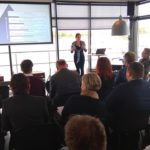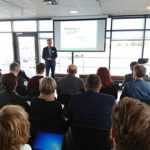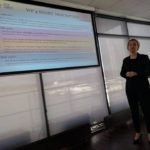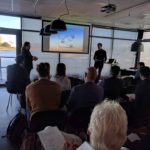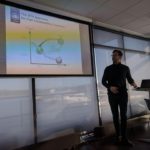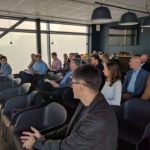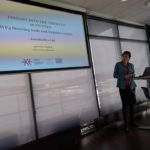The kick-off meeting of the INTERCONNECT project took place in Karlskrona (Sweden) on 4-5th October 2017. Organized by Region Blekinge, the project’s Lead Partner, the event aimed at organizing the work of the partnership while promoting its practical objectives dedicated to the establishment of sustainable cross-border public transport solutions in the South Baltic area.
Interconnect, an EUSBSR Flagship candidate, addresses the challenge of curbing the car-reliant mobility trend in the South Baltic area through user-adjusted and more sustainable public transport services for regional and cross-border travels. The current public transport offer hardly meets customer expectations for easiness and attractivity of regional and cross-border journeys, with a scarce range of integrated ticket options for multimodal rides, difficult access to one-spot passenger information and no clear benefits for users when choosing the public transport over cars.
To enhance car-independent mobility in the region the partnership consisting of 9 formal and 11 associated partners from 6 countries will carry out joint capacity-building, pilot demonstration and advocacy actions. These will tackle the three dimensions of public transport in serving the regional and cross-border travels – the demand, the supply and the governance. Through three thematic measures on: (1) evidence, knowledge and experience; (2) steering tools and business models; and (3) future governance and institutionalization, the project will deliver innovative multi-stakeholder planning approaches for sustainable public transport of the future and invest in new and more efficient services for no-car travelers both in and between the partner areas.
The meeting started with, Mr. Wiktor Szydarowski, Ms. Lise Hallen and Mr. Fredrik Appelqvist from Region Blekinge presenting general information about the project and its management process as required by the Programme. They explained tasks and responsibilities in the project related to budget and spending plans, as well as progress reporting. Mr. Michał Ostrowski, Project Officer in Joint Secretariat of the Interreg South Baltic Programme 2014-2020 contributed with practical information on the SL2014 reporting system.
The second presentation was carried out by Agata Ludwiczak, INTERCONNECT Communication Manager at International Permanent Secretariat of Euroregion Baltic. She presented the Interconnect communication strategy and its main goals and challenges – how to anchor the INTERCONNECT brand in the public transport stakeholder community, raise awareness among decision-makers in the partner areas on the current and future public transport mobility needs, increase their knowledge of how to match them with adequate services and products, and improve stakeholder capacity for cross-border cooperation on public transport issues in the South Baltic area.
Next day started with important activities connected with three thematic measures of the project. Mr. Pawel Warszycki, Executive Director, Hanseatic Institute for Entrepreneurship and Regional Development at the University of Rostock presented detailed plan for the future, including screening of policy and user response to public transport services, seminars on sustainable paths for public transport, Investigation of market needs for regional and cross-border public transport services, analysis of suburban & rural connectivity patterns for public transport, proposals for sustainable solutions in regional and cross-border public transport services.
Another presentation on behalf of Region Blekinge, that deserves to be mentioned was given by Mr. Magnus Forsberg, Strategic planner of public transport. He presented pilot case Blekinge –Pomorskie and a joint cross-border information and ticketing offer for sustainable public transport. Moreover, the presentation included also the information about the deployment of a test version of the information/ticketing portal; installation of a new information system for passengers in the test area, launching of interface solution and development of joint products for cross-border foot passengers.
An important contribution to the INTERCONNECT project was the pilot case of Rostock – Guldborgsund ferry connection. The case was presented by Mr. Andreas Schubert from Hanseatic City of Rostock who was a leader in the INTERFACE project part-financed from the South Baltic Cross-border Co-operation Programme 2007-2013. The INTERFACE project directly focused on upgrading service environment of ferry ports, terminals and harbour surrounding areas with special focus on (foot) passengers, facilitating accessibility of ports and public transport in interface areas for people with reduced mobility, improving cross-border interoperability (harmonized timetables, services) and communication between ferry traffic and traffic operators linking SBA ports with the city centres, implementing intermodal passenger information systems in connection to cross-border transports between SBA cities and regions.
Ms Agnieszka Wojtach and Ms Sylwia Wymysłowska from InnoBaltica Ltd. (Poland) presented a detailed plan of the next activities, particularly a seminar report summing up stakeholder discussion on the performance qualities and setting benchmarks for replication/transfer between the public transport systems in the partner areas in the South Baltic (Blekinge, Pomorskie, Klaipeda area, Guldborgsund, Rostock); joint marketing and product development activities between Pomorskie, Blekinge and Stena Line and; organization of 5 exchange visits to learn from each other to develop and/or improve own services and products for regional and cross-border no-car travels.
The INTERCONNECT project will run for 3 years within the Interreg South Baltic Programme. Comprised of 20 formal and associated partners it will cover analytical and pilot activities on sustainable cross-border public transport within the total budget of 3,46 mln Euro. Euroregion Baltic will lead the dissemination and promotion activities within the project.
By by Agata Ludwiczak
